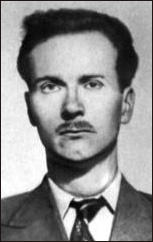John Cairncross | |
|---|---|
 | |
| Born | 25 July 1913 Lesmahagow, Lanarkshire, Scotland |
| Died | 8 October 1995 (aged 82) Herefordshire, England |
| Alma mater | University of Glasgow University of Paris Trinity College, Cambridge |
| Spouses |
|
| Espionage activity | |
| Allegiance | Soviet Union |
| Service branch | Foreign Office The Government Code and Cypher School, Bletchley Park |
| Codename | Liszt |
John Cairncross (25 July 1913 – 8 October 1995) was a British civil servant who became an intelligence officer and spy during the Second World War. As a Soviet double agent, he passed to the Soviet Union the raw Tunny decryptions that influenced the Battle of Kursk. He was alleged to be the fifth member of the Cambridge Five.[1] He was also notable as a translator, literary scholar and writer of non-fiction.
The most significant aspect of his work was helping the Soviets defeat the Germans in battle during the Second World War; he may also have told Moscow that the US was developing a nuclear bomb. Cairncross confessed in secret to MI5's Arthur S. Martin in 1964 and gave a limited confession to two journalists from The Sunday Times in December 1979.[2] He was given immunity from prosecution.
According to The Washington Post, the suggestion that John Cairncross was the "fifth man" of the Cambridge ring was not confirmed until 1990, by Soviet double-agent Oleg Gordievsky. This was re-confirmed by former KGB agent Yuri Modin's book published in 1994, My Five Cambridge Friends Burgess, Maclean, Philby, Blunt, and Cairncross by Their KGB Controller.[3][4]
- ^ Barnes, Julian E. (27 January 2003). "Spy Stories: The Third Man". U.S. News & World Report: 46.
- ^ Bower, Tom (10 October 1995). "OBITUARIES: John Cairncross". The Independent.
- ^ "John Cairncross Dies". The Washington Post. 26 December 2020. Retrieved 31 December 2020.
- ^ "John Cairncross, Fifth Man in Spy Ring, Dead at 82". Chicago Tribune. 11 October 1991. Retrieved 30 December 2020.